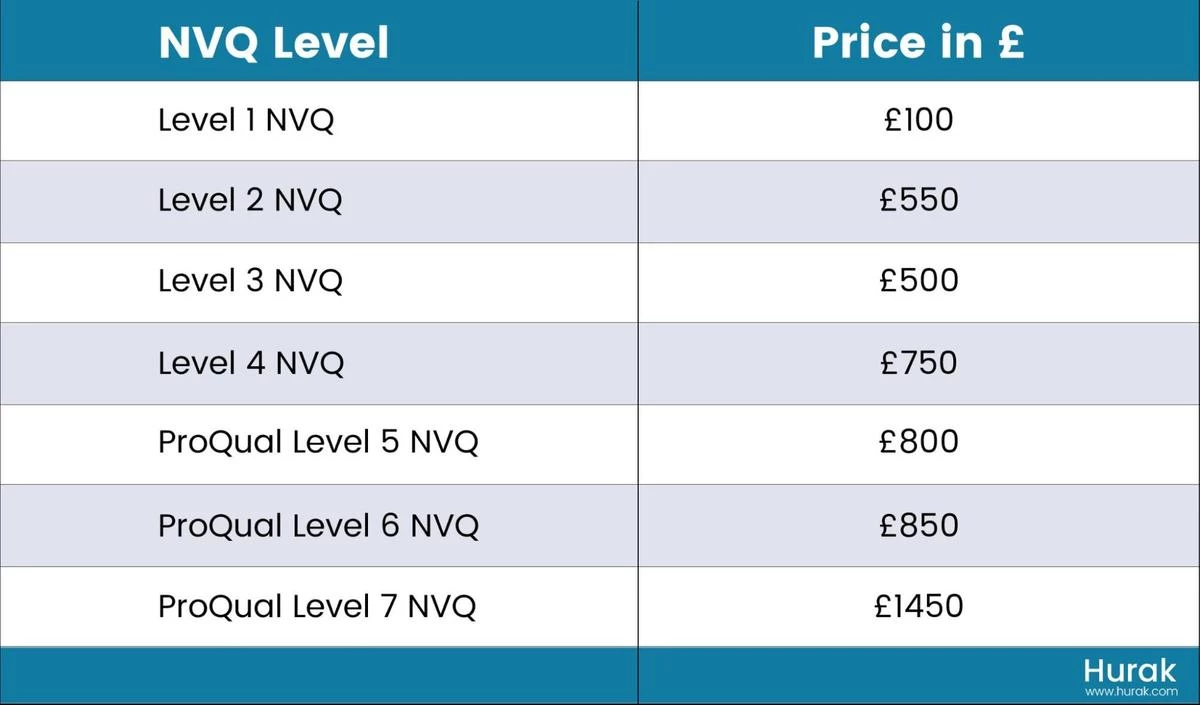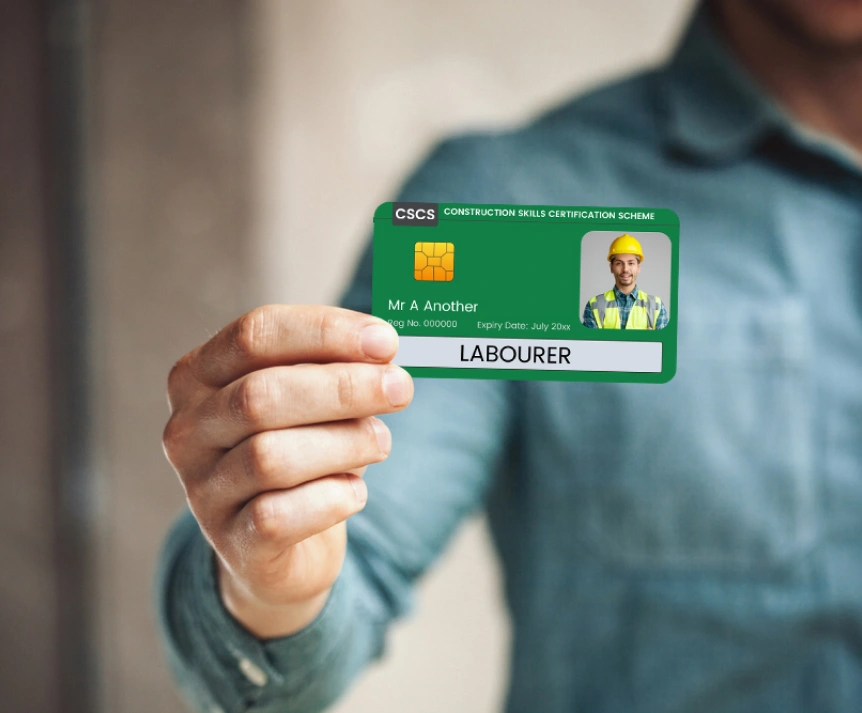To be eligible for a skilled level CSCS card, applicants must hold a nationally recognised construction related qualification. In this blog post, I’ll discuss CSCS qualifications in detail including its types, costs, and more.
Different Types of CSCS Qualifications
To obtain a CSCS card, you must acquire the relevant qualification required for that specific card, and there are different types of CSCS qualifications to consider. Let’s examine these qualification types closely.

National Vocational Qualification (NVQs)
In construction, NVQs play a pivotal role, as they are a mandatory requirement for a number of CSCS cards.
These qualifications serve as a valuable means to demonstrate your competence in your chosen trade or profession. NVQs have a dual role: not only are they a requirement for several CSCS cards, but they also act as evidence to your employer, confirming your competence for work on construction sites.NVQs hold great importance in your construction career, as it’s one of the major requirement for getting different types of CSCS cards.
The specific NVQ level for the required CSCS card varies based on your job role, experience, and qualifications.
For example, to get a CSCS Blue Skilled Worker Card, you will need to hold an NVQ Level 2 or higher in your relevant trade. On the other hand, obtaining a CSCS Gold Supervisor Card requires a higher-level NVQ, such as Level 3 or Level 4, depending on the specific supervisory qualifications.
For example, to get a CSCS Blue Skilled Worker Card, you will need to hold an NVQ Level 2 or higher in your relevant trade. On the other hand, obtaining a CSCS Gold Supervisor Card requires a higher-level NVQ, such as Level 3 or Level 4, depending on the specific supervisory qualifications.
If you’re in Scotland, you’ll need to refer to Scottish Vocational Qualifications (SVQs) instead of NVQs. However, the fundamentals of the qualifications are the same.
Apprenticeships
Apprenticeships are one of the major pathways to obtaining a CSCS card in the UK construction industry. This provides a combination of on-the-job training and classroom learning, allowing you to gain valuable work experience and develop the skills necessary for your job.
Registered apprenticeship is considered a gold standard in job training. Employers in the UK construction sector require apprenticeship from the employees. This is because they face complex workforce challenges due to high competition in the global markets. As for everyone, registered apprenticeship is a proof and best solution for retaining excellent, quality jobs.
Types of Apprenticeships
| Types | |
| Intermediate Level 2 | The equivalent of grade 9-4 |
| Advanced Level 3 | The equivalent of 2-A level |
| Higher Levels 4, 5, 6, and 7 | The equivalent of a foundation degree |
| Degree Levels 6 and 7 | The higher bachelor’s or master’s degree |
HNCs
HNC (Higher National Certificate) is a high-level course for technical skills. This qualification depends on theoretical and practical skills and knowledge. HNC takes one year to complete.
Higher National Certification in construction management develops knowledge such as the use of technology on the site or site administration. This certification is equal to SCQF level 7. The same course will be further used for the supervisor or manager level rank in the construction sector.
HNDs
The HND or Higher National Diploma in the construction industry is considered a professional qualification because it builds on the knowledge of HNC and covers the fundamentals of construction. This includes planning, health and safety, HR, as well as management. HDN takes two years to complete.
Professional Qualifications
Professional qualifications are academic certifications that are required by the employer to assess your knowledge of the construction sector. It often includes your degree in construction or chartered membership in a professional body like CIOB, RICS, ICE, etc.
Moreover, the professional qualifications include degrees from certified universities or training courses that require a high level of competency.
Historical Qualifications
CSCS often requires an old qualification of employees that helps assess their skills and expertise. This includes a city craft or an approved apprenticeship. Other types of historical certifications include employer apprenticeship and guild craft. Generally, most historical qualifications are no longer available.
Cost Of Getting CSCS Qualifications
The cost of CSCS qualifications depends on the type of qualification and the level of certification required. The prices can also differ based on the training provider you choose.
Cost of NVQs
The cost of an NVQ varies depending on what type of card you want.
Check the table below for the estimated cost of NVQ Levels:

Cost of Apprenticeship
As apprenticeship involves training, some companies even pay their employees to learn and gain valuable experiences on the construction site. So there is no cost of apprenticeship.
Cost of HNCs
The cost of a Higher National Certificate (HNC) depends on the level and type of the certification. The cost of HNC varies and it usually starts from £4000 and reaches a maximum of £8000. This course is offered by higher education colleges in the UK and it lasts for one year.
Cost of HNDs
The Higher National Diploma(HND) in the United Kingdom is in the category of higher education certificate. If you meet the eligibility criteria, HND will cost you around £1285 per year. This cost is for those who are living in the UK. If you are living outside the UK then you may be charged a higher rate of £3000 per year.
Cost of Professional Qualifications
Typically, professional CSCS qualifications can include an undergraduate degree in a relevant field. The cost of an undergraduate degree in the UK depends on several factors such as the university, the course’s duration, and whether it is for home/EU students or international students.
The tuition fees for a full-time undergraduate degree for home/EU students in the UK generally range from approximately £9,000 to £9,250 per year. However, for international students, the fees are typically higher, ranging from around £10,000 to £38,000 per year, depending on the university and the chosen programme.
CSCS Cards and Their Relevant Qualifications
There are a number of CSCS cards available. These cards show the level and qualifications of the workers. There are different colours on each card, reflecting the occupation of each labour.
Let us talk further about CSCS cards and the CSCS qualifications required for getting these cards:
CSCS Green Card
The green CSCS labourer card is for entry-level workers, but it still requires some qualifications for working on a construction site. It is a must for green CSCS card holders to have an awareness of important health and safety considerations.
Getting this card requires one of the following qualifications:
- QCF level 1
- SCQF level 4 award in health and safety
- SCWF level 5 REHIS certificate
- Alternatives to the level 1 award

CSCS Blue Card
A blue CSCS card is for the skilled worker. For a blue CSCS card, you need to complete an NVQ or SVQ level 2 in the construction field. Another option to obtain a blue card is to complete an apprenticeship that is approved by CSCS.
CSCS Gold Card
As the name shows, the gold CSCS card is for experienced staff. This card is for the labour who are highly skilled in the construction sector and acquire advanced qualifications.
Some of the major qualifications that are necessary to obtain a gold CSCS advanced card are
- NVQ/SVQ Level 3
- Apprenticeship
- Employer-Sponsored Apprenticeship
CSCS Black Card
CSCS black card is a senior-level card that is available to managers. To obtain a CSCS black card, you need to have an NVQ or SVQ level 4, 5, 6, or 7 in construction management. Even if a low-skilled worker completes the required qualification and gets succeeded in achieving this card, they get prioritised by the employer.
CSCS White Card
CSCS white card is for those who don’t necessarily work on the construction site, rather they visit as an architect or a surveyor. This card shows that you’re certified and professional enough to safely visit the construction site. The White CSCS card is valid for 5 years and can be renewed.
There are two types of white CSCS cards available:
CSCS White Card (Academically Qualified Person)
This CSCS white card requires a college degree in construction-related courses. If you have completed a relevant HND, HNC, or even have CIOB or NEBOSH certificates, you can get this white card which is primarily for academically qualified people. Moreover, getting a white card means you’re capable of managing site operations without any supervision. The AQP card is valid for 5 years.
Requirements for this card:
1. Qualification certificate
2. Passing the CITB HS&E Test
CSCS White Card (Professionally Qualified Person)
This type of white CSCS card is designed specifically for those who are members of the approved CSCS professional bodies. These bodies include the ICE, CIOB, RICS, etc. The validity of this card is 5 years, but you don’t have the option to renew this card. However, you can reapply for a CSCS white card.
Requirements for this card:
- Must be a member of one of the approved professional bodies.
- Pass a CITB HS&E Test
Importance of CSCS Qualifications
Construction Skills Certification Scheme (CSCS) qualifications are important to ensure workplace safety. As the construction industry often faces hazardous conditions, CSCS qualifications ensure workers have the skills and knowledge to use heavy machinery, equipment, and sharp tools.
Let’s read the following points to understand the importance of CSCS qualifications.
Promotes Safe Work Environment
Safety is the top priority in the construction industry. CSCS qualifications help promote a safer work environment by ensuring that workers are aware of the potential hazards and possess the knowledge to mitigate risks effectively.
Acceptance on National Level
CSCS is widely recognised in the construction sector, and having a CSCS card is a prerequisite for employment. Many construction companies and contractors require their workers to hold CSCS qualifications to ensure that they are hiring competent labour.
Gives Better Job Opportunities
CSCS qualifications can open doors to better job opportunities and career advancement. As workers gain more experience and acquire higher-level qualifications, they become eligible for more challenging and rewarding roles within the industry.
Meeting Legal Requirements
In some cases, CSCS qualifications are a legal requirement for specific construction tasks. For example, certain construction sites and public-sector projects mandate that all workers possess valid CSCS cards.
Download our CITB Operatives and Specialists Test Prep Book for free!
×
Frequently Asked Questions
Who should get CSCS qualifications?
CSCS qualifications are relevant to anyone working in or aspiring to work in the construction industry, from labourers to project managers.
What are the minimum requirements for a CSCS card?
You must be 16+ years old, have obtained the required CSCS qualification, and have passed the CITB health, safety, and environment test.
Can I apply for a higher-level CSCS card later in my career?
Yes, you can apply for a higher-level CSCS card as you gain more experience and advance in your career.
Is CSCS a professional qualification?
Yes, CSCS is a professional qualification that works as proof that you are a certified professional to work in the UK construction industry.
What qualifications do I need for a CSCS card?
It depends on the type of CSCS card you want to obtain. For example, for a green CSCS card, you need to get one of the CSCS qualifications from the list below:
- An RQF Level 1/SCQF Level 4 Award in Health and Safety in a Construction Environment.
- An SCQF Level 5 REHIS Elementary Health and Safety Certificate.
- The NOCN/C Skills Awards Construction Health and Safety (F/618/0738) unit
- Alternatives to the level 1 award
Final Words!
CSCS qualifications are a mandatory requirement for CSCS cards. These qualifications have various types and levels to match different roles within the construction industry, from labourers to skilled professionals. By obtaining the appropriate CSCS qualification, you can
These qualifications ensure that workers have the right skills and knowledge to perform their jobs safely and effectively.




